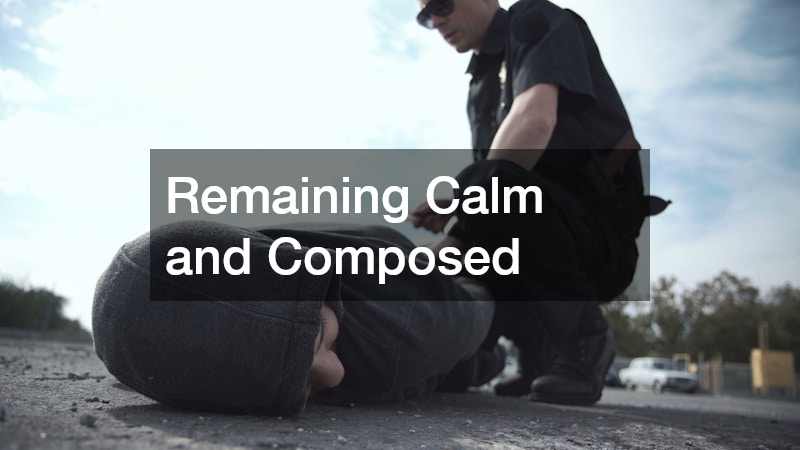Being arrested is a stressful and often overwhelming experience, especially if it happens unexpectedly. In such moments, thinking clearly or knowing what to do next can be difficult. However, your behavior and decisions during and immediately after an arrest can significantly affect the outcome of your case. Knowing your rights, staying composed, and taking the right steps early on can protect you legally and personally.
This guide is designed to help individuals understand what actions they should take if they’ve been arrested. From maintaining your composure to asserting your legal rights, each step is crucial in safeguarding your freedom and minimizing long-term consequences. Whether it’s your first encounter with law enforcement or not, being informed can make all the difference.
Remaining Calm and Composed

When you’re placed under arrest, it’s completely natural to feel a surge of panic, fear, or frustration. However, staying calm is one of the most important things you can do in that moment. The way you respond during the initial interaction with law enforcement can either help protect your rights or potentially make your situation worse.
Officers closely observe your behavior from the moment they engage with you, and any signs of aggression, resistance, or emotional outbursts could lead to additional charges or complications. By remaining composed, you give yourself the ability to think more clearly, make sound decisions, and later recall key details that may support your defense. Keeping your emotions in check helps create a safer and more manageable environment during a highly stressful experience.
If you’ve been arrested on suspicion of driving under the influence, for instance, keeping calm can help you avoid saying or doing anything that might be used against you in court. A dui lawyer will later review your conduct and the procedures followed by officers, so maintaining your composure can provide a cleaner case for your defense. Staying level-headed may also influence how officers treat you throughout the process, making the experience less intimidating and more manageable.
Understanding Your Legal Rights
One of the most important things to do after being detained is to fully understand your legal rights. These include the right to remain silent, the right to legal representation, and the right to be informed of the charges against you. These fundamental protections are designed to ensure fair treatment and to safeguard individuals from unjust legal consequences.
Knowing and exercising your rights can prevent you from saying or doing something that could harm your case. In a high-pressure situation, it’s easy to feel intimidated or confused, which makes it even more crucial to stay grounded in your legal protections. By understanding these rights, you can better navigate the legal process and reduce the risk of being misled or manipulated during questioning.
If you’ve been arrested, your first priority should be to exercise your right to legal representation. A criminal defense attorney can advise you on how to proceed, protect your rights during questioning, and begin building your defense immediately. Without proper knowledge or counsel, you may unknowingly waive important rights or provide information that could be used against you later. Having someone who understands the legal system on your side from the beginning is essential.
Avoiding Self-Incrimination
When you’re confronted by law enforcement, it’s completely natural to want to explain your side or clear up what you believe is a misunderstanding. However, speaking without legal guidance can put you at risk, even if you think you’re being helpful or honest. The safest approach is to stay quiet and wait for legal representation before answering any questions.
The Fifth Amendment protects your right to remain silent, and exercising that right is one of the smartest things you can do after an arrest. Even seemingly harmless or truthful statements can be misinterpreted, taken out of context, or used to build a case against you. The less you say during this time, the greater your chance of navigating the legal process fairly and without unnecessary complications.
This is especially important if you’ve been arrested due to a suspected probation violation. Anything you say could be interpreted as an admission of wrongdoing and complicate your probation status or lead to harsher penalties. Remaining silent until your lawyer is present isn’t an admission of guilt—it’s a smart and lawful way to protect yourself from unintended consequences.
Asking for an Attorney Immediately

As soon as you are taken into custody, one of the most important steps you can take is to calmly and clearly ask for an attorney. This isn’t just a legal formality—it’s a vital safeguard for protecting your rights. Once you request legal counsel, law enforcement is required to stop questioning you until your attorney is present.
You are only obligated to provide basic identifying information, and anything beyond that can be used against you in court. Having a lawyer by your side ensures that you don’t unintentionally say something that could damage your case. An attorney understands the legal system and can guide you through each step, helping to avoid costly mistakes and advocating for your best interests from the very beginning.
Even if you’ve been arrested for something seemingly unrelated, such as an incident that later leads to civil claims, it’s important to get legal help right away. A personal injury attorney, for example, may not be your first call, but if injuries occurred during the arrest or if there’s potential for civil litigation, having legal support from the start can protect your rights on multiple fronts. Always request an attorney before speaking to law enforcement in detail, no matter the circumstances.
Documenting the Arrest Experience
If possible, document everything you remember about your arrest as soon as possible. Note the names of the officers involved, what they said and did, the time and location of the incident, and any witnesses present. While these details might seem insignificant at the time, they can play a key role in building your defense and providing a clear account of what transpired.
Accurate records of the events can help your attorney identify any procedural errors or potential rights violations that may have occurred during the arrest. Even small discrepancies in how the arrest was handled could significantly impact the outcome of your case. The more detailed your recollection, the better equipped your legal team will be to challenge the actions of law enforcement if necessary.
This is particularly important if your arrest occurred in a sensitive setting, such as near child care centers, where extra scrutiny or specific legal standards may apply. If you’ve been arrested in such a location, the context and environment can shape the way your case is handled. Documenting everything thoroughly ensures your attorney has all the information needed to advocate for you effectively and challenge any questionable procedures.
Complying Without Volunteering Information
Cooperating with law enforcement during an arrest is important, but it’s crucial to remember that you don’t need to offer more information than is required. You have the right to remain silent, and exercising this right helps protect you from saying something that could unintentionally harm your case. Basic information, such as your name and address, may be required, but beyond that, you are not obligated to provide any further details.
Volunteering additional information can complicate your situation, particularly if your words are taken out of context or misunderstood. Even seemingly harmless comments can be misinterpreted in a way that works against you. It’s always better to remain as silent as possible until you have legal representation, ensuring that you don’t inadvertently create issues that could jeopardize your defense.
For example, if you’ve been arrested in a situation involving firearms, anything you say about ownership, usage, or possession could have serious legal implications. Law enforcement may ask seemingly casual questions to gather more information, but these conversations are not casual for you. It’s best to comply respectfully while keeping your responses minimal until your attorney is present. Protecting your rights often means saying less, not more.
Contacting a Trusted Family Member

After being arrested, one of the most beneficial steps you can take is to reach out to a trusted family member or close friend. This individual can help by arranging for legal counsel, securing your bail, and gathering any necessary documents or information related to your case. Having someone who is informed and involved can ease the burden of navigating this stressful situation, providing both practical and emotional support.
When choosing someone to contact, it’s important to select someone calm, reliable, and discreet, as they may become involved in sensitive aspects of your case. This person can also serve as a valuable point of contact, helping to coordinate next steps and keep you updated. Knowing that you have a trusted person by your side can provide you with reassurance as you move through the legal process.
If you’ve been arrested while living in or connected to supportive housing, it’s especially important to involve a family member who can advocate on your behalf and communicate with your housing provider or case manager. Arrests can sometimes impact housing eligibility or stability, so acting quickly can help minimize disruptions. A trusted family member can be your voice on the outside while you focus on protecting your legal rights.
Preparing for Your Arraignment
The arraignment is your first formal court appearance after an arrest, where the charges against you are read, and you’ll have the opportunity to enter a plea. Preparing for this moment is critical, as it can set the tone for how your case proceeds. Understanding what to expect and having legal representation in place ensures you can make informed decisions. Your attorney may also negotiate bail terms or argue for your release, so preparation ahead of time is essential.
If you’ve been arrested, contacting a reputable bail agency can be a practical step before your arraignment. A bail agent can help you understand your options, assist in posting bail quickly, and ensure that the process moves smoothly. Having this support in place may reduce the time you spend in custody and give you a better chance to prepare for your defense with your legal team.
Following Legal Advice Carefully
Once you’ve secured legal representation, it’s vital to listen closely and follow your attorney’s guidance. Your lawyer understands the legal system and the best strategies for protecting your rights. Even if their advice feels counterintuitive, it’s based on legal experience and an understanding of how your specific charges might play out in court. Trusting your attorney and communicating openly can make a substantial difference in the outcome of your case.
If you’ve been arrested in connection with a traffic-related incident, especially one involving injuries, your legal situation could involve both criminal and civil issues. In such cases, a car accident lawyer might work in tandem with your defense attorney to handle related claims. Following your lawyer’s instructions, both during and after your arrest, will help ensure that all aspects of your case are managed properly and with your best interests in mind.
Knowing What to Expect Next

The legal process after an arrest doesn’t end with arraignment. Depending on the charges and circumstances, you may face pre-trial hearings, negotiations, or even a trial. Understanding what comes next helps reduce anxiety and allows you to make informed choices about your defense. Staying in close contact with your attorney and remaining proactive about your case are crucial steps as your situation unfolds.
For some individuals who’ve been arrested, additional legal issues can arise, especially if family or estate matters are involved. For example, if an arrest impacts the management of a family estate or guardianship responsibilities, consulting with a probate attorney may be necessary. Knowing the broader implications of your legal troubles allows you to address every aspect with the appropriate guidance and care.
Being arrested is an incredibly unsettling experience, but it doesn’t have to define your future. What you do immediately afterward—how you respond, who you contact, and what rights you exercise—can significantly shape the legal path ahead. Understanding your options, staying calm, and relying on professional legal support allows you to navigate the situation with greater confidence and clarity.
Whether you’ve been arrested for a minor offense or something more serious, your actions matter. Protecting your rights begins with knowledge and continues with smart, measured decisions. By following the guidance outlined in this blog, you can move forward from your arrest with a clearer path and the support you need to regain control of your life.

